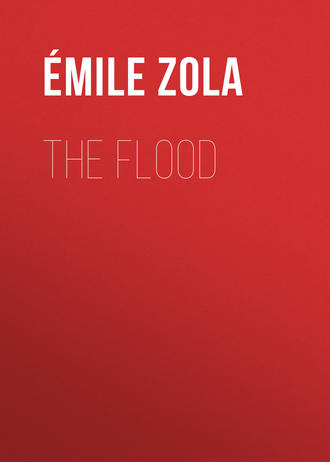
Эмиль Золя
The Flood
“We can’t let him die like that,” said Jacques, distracted. “We must get down there.”
“Perhaps we could slide down the beams and save him,” remarked Pierre.
And they started toward the neighboring roof, when the second house collapsed, leaving a gap in the route. Then a chill seized us. We mechanically grasped each other’s hands, wringing them cruelly as we watched the harrowing sight.
Cyprien had tried at first to stiffen his body. With extraordinary strength, he had lifted himself above the water, holding his body in an oblique position. Rut the strain was too great. Nevertheless, he struggled, tried to reach some of the beams, felt around him for something to hold to. Then, resigning himself, he fell back again, hanging limp.
Death was slow in coming. The water barely covered his hair, and it rose very gradually. He must have felt its coolness on his brain. A wave wet his brow; others closed his eyes. Slowly we saw his head disappear.
The women, at our feet, had buried their faces in their clasped hands. We, ourselves, fell to our knees, our arms outstretched, weeping, stammering supplications.
On the other roof Aimee, still standing, her children clasped to her bosom, howled mournfully into the night.
IV
I know not how long we remained in a stupor after that tragedy. When I came to, the water had risen. It was now on a level with the tiles. The roof was a narrow island, emerging from the immense sheet. To the right and the left the houses must have crumbled.
“We are moving,” murmured Rose, who clung to the tiles.
And we all experienced the effect of rolling, as if the roof had become detached and turned into a raft. The swift currents seemed to be drifting us away. Then, when we looked at the church clock, immovable opposite us, the dizziness ceased; we found ourselves in the same place in the midst of the waves.
Then the water began an attack. Until then the stream had followed the street; but the debris that encumbered it deflected the course. And when a drifting object, a beam, came within reach of the current, it seized it and directed it against the house like a battering-ram. Soon ten, a dozen, beams were attacking us on all sides. The water roared. Our feet were spattered with foam. We heard the dull moaning of the house full of water. There were moments when the attacks became frenzied, when the beams battered fiercely; and then we thought that the end was near, that the walls would open and deliver us to the river.
Gaspard had risked himself upon the edge of the roof. He had seized a rafter and drawn it to him.
“We must defend ourselves,” he cried.
Jacques, on his side, had stopped a long pole in its passage. Pierre helped him. I cursed my age that left me without strength, as feeble as a child. But the defense was organized – a drill between three men and a river. Gaspard, holding his beam in readiness, awaited the driftwood that the current sent against us, and he stopped it a short distance from the walls. At times the shock was so rude that he fell. Beside him Jacques and Pierre manipulated the long pole. During nearly an hour that unending fight continued. And the water retained its tranquil obstinacy, invincible.
Then Jacques and Pierre succumbed, prostrated; while Gaspard, in a last violent thrust, had his beam wrested from him by the current. The combat was useless.
Marie and Veronique had thrown themselves into each other’s arms. They repeated incessantly one phrase – a phrase of terror that I still hear ringing in my ears:
“I don’t want to die! I don’t want to die!”
Rose put her arms about them. She tried to console them, to reassure them. And she herself, trembling, raised her face and cried out, in spite of herself:
“I don’t want to die!”
Aunt Agathe alone said nothing. She no longer prayed, no longer made the sign of the cross. Bewildered, her eyes roamed about, and she tried to smile when her glance met mine.
The water was beating against the tiles now. There was no hope of help. We still heard the voices in the direction of the church; two lanterns had passed in the distance; and the silence spread over the immense yellow sheet. The people of Saintin, who owned boats, must have been surprised before us.
Gaspard continued to wander over the Roof. Suddenly he called us.
“Look!” he said. “Help me – hold me tight!”
He had a pole and he was watching an enormous black object that was gently drifting toward the house. It was the roof of a shed, made of strong boards, and that was floating like a raft. When it was within reach he stopped it with the pole, and, as he felt himself being carried off, he called to us. We held him around the waist.
Then, as the mass entered the current, it returned against our roof so violently that we were afraid of seeing it smashed into splinters.
Gaspard jumped upon it boldly. He went over it carefully, to assure himself of its solidity. He laughed, saying joyously:
“Grandfather, we are saved! Don’t cry any more, you women. A real boat! Look, my feet are dry. And it will easily carry all of us!”
Still, he thought it well to make it more solid. He caught some floating beams and bound them to it with a rope that Pierre had brought up for an emergency. Gaspard even fell into the water, but at our screams he laughed. He knew the water well; he could swim three miles in the Garonne at a stretch. Getting up again, he shook himself, crying:
“Come, get on it! Don’t lose any time!”
The women were on their knees. Gaspard had to carry Veronique and Marie to the middle of the raft, where he made them sit down.
Rose and Aunt Agathe slid down the tiles and placed themselves beside the young girls. At this moment I looked toward the church. Aimee was still in the same place. She was leaning now against a chimney, holding her children up at arm’s length, for the water was to her waist.
“Don’t grieve, grandfather,” said Gaspard. “We will take her off on the way.”
Pierre and Jacques were already on the raft, so I jumped on. Gaspard was the last one aboard. He gave us poles that he had prepared and that were to serve us as oars. He had a very long one that he used with great skill. We let him do all the commanding. At an order from him, we braced our poles against the tiles to put out into the stream. But it seemed as if the raft was attached to the roof. In spite of all our efforts, we could not budge it. At each new effort the current swung us violently against the house. And it was a dangerous manoeuvre, for the shock threatened to break up the planks composing the raft.
So once again we were made to feel our helplessness. We had thought ourselves saved, and we were still at the mercy of the river. I even regretted that the women were not on the roof; for, every minute, I expected to see them precipitated into the boiling torrent. But when I suggested regaining our refuge they all cried:
“No, no! Let us try again! Better die here!”
Gaspard no longer laughed. We renewed our efforts, bending to our poles with redoubled energy. Pierre then had the idea to climb up on the roof and draw us, by means of a rope, towards the left. He was thus able to draw us out of the current. Then, when he again jumped upon the raft, a few thrusts of our poles sent us out into the open. But Gaspard recalled the promise he had made me to stop for our poor Aimee, whose plaintive moans had never ceased. For that purpose it was necessary to cross the street, where the terrible current existed. He consulted me by a glance. I was completely upset. Never had such a combat raged within me. We would have to expose eight lives. And yet I had not the strength to resist the mournful appeal.
“Yes, yes,” I said to Gaspard. “We can not possibly go away without her!”
He lowered his head without a word, and began using his pole against all the walls left standing. We passed the neighboring house, but as soon as we emerged into the street a cry escaped us. The current, which had again seized us, carried us back against our house. We were whirled round like a leaf, so rapidly that our cry was cut short by the smashing of the raft against the tiles. There was a rending sound, the planks were loosened and wrenched apart, and we were all thrown into the water. I do not know what happened then. I remember that when I sank I saw Aunt Agathe floating, sustained by her skirts, until she went down backward, head first, without a struggle.







